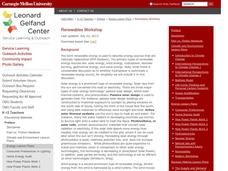Bonneville
Engaging with Solar Panels
Build a fan and become a fan of solar power. The second of 14 lessons in the Cost Effective Solar Cells unit has learners first construct circuits with solar cells to power a fan, a motor, and an LED. They then test their circuits both...
Carnegie Mellon University
Renewables Workshop
Youngsters examine resource maps to find out which states are using solar and wind power and discuss as a class various other renewable energy sources. They use a provided data table to record pros and cons to each technology, build and...
Wind Wise Education
What is the Cost of Inefficiency?
What does it cost to keep the lights on? Through a hands-on activity, class members use a watt meter and determine the amount of energy different types of light bulbs use. The class then determines the financial and environmental cost of...
Bonneville
Variables Affecting Wind Turbine Power
Design the best from the best. Groups work together to come up with the best configuration of different variables that affect a wind turbine. The teams choose from several variables such as the number of blades, the angle of the blades,...
Foundation for Water & Energy Education
How Can Work Be Done with Water Power? Activity C
Third in a set of lessons regarding reservoirs, dams, and hydropower, this involves a two-day hydropower plant simulation. Collaborative groups build, maintain, and finance the plant. The transparency of the reservoir setup can be...
Energy for Keeps
Going for a Spin: Making a Model Steam Turbine
Discover the effectiveness of wind, water, and steam as energy sources. The hands-on activity has young scientists create a turbine from common materials. After constructing the turbines, they use wind, water, and steam to turn them and...
Bonneville
Introduction to Circuits
Light up the class's knowledge. Pupils build a simple circuit using a battery, wire, and a light bulb and create a diagram of their circuit. The teacher provides a short lecture on a complete circuit, calling attention to the direction...
University of Colorado
The Jovian Basketball Hoop
Can you listen to Jupiter on a simple radio? Turns out the answer is yes! The resource instructs scholars to build a simple radio to pick up the radio waves created when the charged particles from the sun hit Jupiter's magnetic...
California Academy of Science
Rapid Brainstorming: How Can We Conserve Our Water Resources?
Water covers around 75 percent of the earth, yet humans struggle to find enough fresh water to live. The fourth of 10 lessons focusing on Fresh Solutions requires brainstorming. Young scientists consider various problems related to fresh...
Rochester Institute of Technology
Artificial Hearing
Your sense of hearing depends upon tiny hairs deep inside your ear and if you lose these hairs, you lose your hearing. Here, groups explore hearing through the decibel measurement of common sounds. As a class, participants discuss...
Curated OER
Fuel Cell Experimentation
With rising oil prices and increasing concerns over global warming, the pressure is on for engineers to develop alternative sources of energy. Among the new technologies being developed are hydrogen fuel cells, which young scientists...
WindWise Education
How Does a Generator Work?
I get a charge out of this. In order to learn how a generator works, groups build and test one in this ninth lesson of the series. The generators are tested at low speed and high speed to determine the watt output and whether they have...
K20 LEARN
Timmy Made Mistakes: Lab Safety
It's better to be safe than sorry ... just ask Timmy! Engage learners with a hilarious lab safety review activity. The lesson, part of the K20 series, revolves around identifying, describing, and remediating disastrous lab practices.
Science Matters
Conductors and Insulators
Get that energy flowing while classes study conductors and insulators. Using a simple circuit, learners test different materials to determine the strength of conductivity. They use their results to classify materials as conductors or...
Science Matters
Series Circuit and Switches
Lights out! Scholars build on their understanding of a simple circuit by adding a switch and creating schematic drawings. The eighth activity in a series of 14 has pupils use everyday materials to create circuits and make observations as...
Bonneville
Introduction to Energy
Transform the classroom with energy. Pupils learn about different types of energy and practice identifying the types in the first lesson plan of six in a solar versus wind energy unit. The class sees examples of how one type of energy...
Bonneville
Variables Affecting Solar Power
Determine the best energy generator. Groups play with a photovoltaic cell to determine the variables that affect its energy output. The teams investigate a variable to determine the optimum performance of the solar cell. Pupils compare...
Bonneville
Solar Panel Basics
Going outside is a logical step when dealing with solar panels. Future scientists learn about the n-type and p-type layers of solar cells in the third of 14 lessons in the Cost Effective Solar Cells unit. They go outside to model the...
Bonneville
Copper Oxide Cell Data Sharing
Sharing is caring—and good for learning, too. Learners share data from the experiment in the previous lesson by engaging in a gallery walk. They then consider and discuss the conditions under which a solar cell will have its maximum...
Curated OER
Making New Electricity
Students investigate the concepts of energy conversion and conservation. They research the history of energy conversions into electrical energy. They design experiments in order to replicate a conversion of energy into electricity.
Curated OER
Electrifying the World
Students explore the fundamental concepts of electricity. They examine different circuit diagrams to study how electricity flows. They finish by creating their own simple circuit.
Curated OER
TE Activity: Build a Charge Detector
Young scholars examine how electrical force takes place between two objects by building an electroscope. They apply the electroscope to determine an objects' charge intensity and to see what factors influence electric force.
Curated OER
Can You Get A Charge Out Of Matter?
Students observe and demonstrate how objects can be charged positively and negatively and how static electricity works. They observe a teacher-led demonstration, and in small groups rotate through various static electricity activities,...
Curated OER
Electrical Battery
Students investigate the different types of batteries and how they work. In this energy instructional activity students experiment with batteries and see which ones last the longest.
Other popular searches
- Science Electricity Year 2
- Physical Science Electricity
- Science Electricity Switches
- Primary Science Electricity
- Science Electricity Terms
- Life Science Electricity
- Science Electricity Wind
- Science Electricity English
- Science Electricity Lessons
- Science Electricity Internet
- 5th Science Electricity
- Pe Science Electricity
























